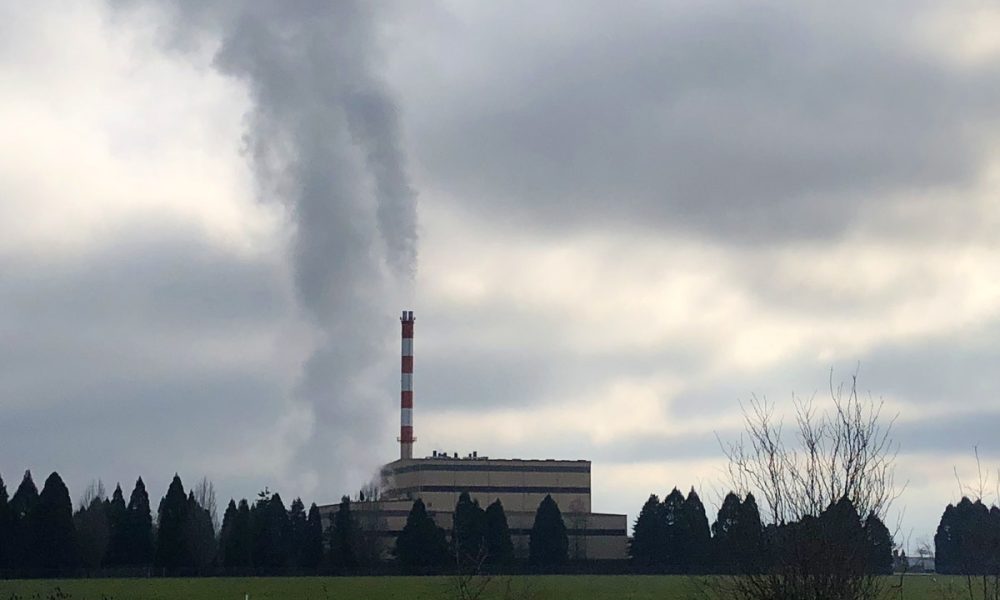 Covanta Marion, a trash incinerator in Brooks, burns roughly 170,000 tons of garbage every year. (Troy Brynelson/Salem Reporter)
Covanta Marion, a trash incinerator in Brooks, burns roughly 170,000 tons of garbage every year. (Troy Brynelson/Salem Reporter)
Local garbage will be shipped to Brooks another year under a deal approved by Marion County commissioners that will avoid a shutdown and gives the plant operator another run at state politics.
Commissioners Kevin Cameron, Sam Brentano and Colm Willis agreed to extend until Sept. 20, 2020, its deal with the incinerator’s New Jersey parent company, Covanta.
Covanta has said it may mothball the facility, which burns garbage and biomass to produce energy, if legislators don’t specifically tag the plant as a source of renewable energy. Such a designation would enable Covanta to make a reported $5 million per year by selling its power at a premium to Portland General Electric.
Brian May, director of the county Environmental Services Department, said officials will now watch what lawmakers decide during the 2020 short session.
“We’re giving Covanta the chance. We’ll know by March if they’re successful or not,” said May.
Marion County currently gets 90 cents of every dollar of the plant’s electricity sales.
Before the vote, Cameron defended the incinerator against those who say it’s not safe for the environment, and blasted the slate of lawmakers whose support never came.
“This last session, the body that’s over there now does not think it’s renewable — unlike 36 other states, and the feds, and Europe — and we’re doing this one-year contract because we don’t know if we’re going to be able to continue this program if we don’t get those renewable energy credits,” he said. “We’ve been processing waste at this facility for 30 years. We’ll get an email saying we’re killing people or hurting people or whatever. And there’s no evidence anywhere of any of that.”
Cameron, who was a state representative before becoming a commissioner, mentioned that without Covanta, the county would have to truck garbage to a landfill in Arlington, in far eastern Oregon.
“They’re all worried about carbon footprint. They’re not even considering the carbon footprint of diesel trucks running up and down the freeway,” he said. “It’s insane.”
Cameron referred to legislators as “whackos” save for Sen. Peter Courtney, D-Salem, and House Speaker Tina Kotek, D-Portland.
“I have to give some compliments to leadership in the fact that, Senator Courtney has really tried to help us and even Speaker Kotek last session tried to help us but just couldn’t get it done because of the whackos that are running things over there, environmentally, don’t recognize what’s good for this state on an environmental basis.”
Reached by phone Wednesday, May said Marion County has no long-term plan if Covanta Marion closed.
Coffin Butte, a landfill in Corvallis, could accept the garbage at first, he said, but he wasn’t sure how much it could take for the years ahead. Officials from Republic Services, which operates the landfill, told Salem Reporter in August that the landfill has capacity for at least 40 years.
Still, May said Marion County hasn’t been in touch with Coffin Butte.
“We do not have a long-term solution,” he said. He did say that landfills near the Columbia River Gorge do have a lot of capacity and called them “one of the main options for us.”
Marion County has contracted a consulting firm with expertise in recycling and waste management to discern what to do if Covanta Marion closed, May said.
It remains to be seen how Covanta will fare in the 2020 session. Lawmakers who helped the energy credits proposal have said they may be less willing after the recent failure.
Covanta, which opened in Brooks in 1987, burns roughly 170,000 tons of trash every year and generates about 13.1 megawatts of electricity, according to the county.
Covanta officials say the extra money is needed to fund ongoing maintenance at the 32-year-old incinerator. A spokesman for Covanta, James Regan, said Wednesday the company is pleased with the extension.
“Now it gives us some time to address the (renewable energy credit) issue and ensure the economic outlook of the facility,” Regan said.
Environmentalists doubt incineration should be treated as renewable, like solar and wind, and say that providing another revenue stream to the company is a step backward.
Lisa Arkin, executive director of the group Beyond Toxics, said waste-to-energy is not renewable because, like a landfill, it relies on people continuing to make trash. She said people should be reducing trash.
“It’s not sustainable to keep creating trash that you have to haul it to an incinerator and use fossil fuels to burn the stuff,” she said.
According to the Oregon Department of Environmental Quality, Covanta ranks No. 20 on the list of largest greenhouse gas emitters in the state. In 2017, it emitted 160,843 metric tons — largely carbon dioxide.
The Columbia Ridge Landfill in Arlington and the Lane County Short Mountain Landfill in Eugene rank Nos. 14 and 21 on that list, respectively.
Regan said Wednesday that spurning waste-to-energy facilities would still put more trash in landfills, a move he said is ultimately more harmful.
Have a tip? Contact reporter Troy Brynelson at 503-575-9930, [email protected] or @TroyWB.









